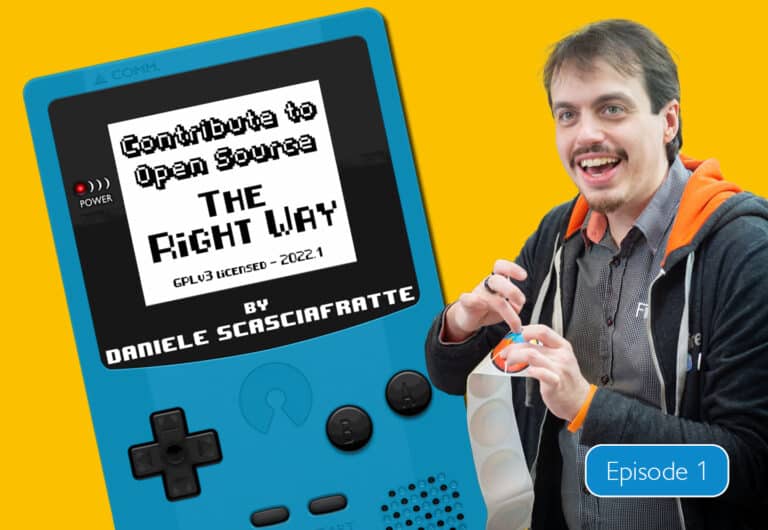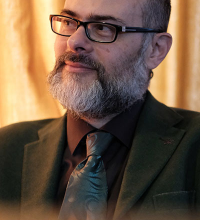Contribute to Open Source: The Right Way – Interview with Daniele Scasciafratte

The third edition of Contribute to Open Source: the right way by Daniele Scasciafratte has now been released. We interviewed Daniele to learn more about his projects, his take on Linux and FOSS, and his book.
Daniele is a full stack developer and a Council Member of the Italian Linux Society (an LPI Partner). He has a deep and long-running involvement in the Italian and international FOSS landscape.
Can you tell us about your book Contribute to Open Source: the right way? What inspired you to write it?
The idea started because I always got the same questions during events and talking with people. Because I like documentation I said, well, it’s time to write something. It was the period after my second term in the Mozilla Reps Council. I learned a lot there about community management, management procedures, and terms such as objectives and key results (OKRs) that, as a FOSS developer, I hadn’t thought much about before. Also, I wrote some guides during that time that are now part of the book’s appendix.
The idea was to merge my experience with the two most significant communities I was involved in at the time, Mozilla and WordPress (both in the local and international environment), with my experience in my personal projects. I joined my own experience with insights from the many books I read about self-help from coaching, tech speaking (I was also part of the Mozilla TechSpeaker program), communication, and other soft skills, which again, as a developer, I hadn’t cared about much before.
I was a mentor in many projects to help people to learn the first steps to contribute or how to write a ticket and reach the right person or project about the issue/problem/need.
As a maintainer and co-maintainer of different projects, I was determined to create a starting manual that wasn’t boring, was informal and easy to read, and had no corporate or enterprise buzzwords, feeling it was the right way to help a newbie or experienced person improve.
After all, open source is based on learning from others’ experience, so why not learn personal knowledge rather than just technical knowledge?
In the third edition of your book, what updates or changes have you made compared to previous editions? What can readers expect to find in this latest version? What, let’s say, “behavioral patterns” in the FOSS landscape have you had to address?
I did the most recent update at the start of the COVID-19 pandemic, that is, more or less after one year after the first edition. The third edition focused on my experience with the Italian Linux Society and a Linux user group (ILS Rieti) that I founded just a year before, while addressing all the problems I saw happening during these online-only times.
As an example, the burnout that contributors can get on the most significant projects, but also on tiny ones, became a popular topic very quickly. The book covers the duties of a code maintainer, funding (remember that not everyone knows how FOSS projects survive) and a personal overview about the tech sphere, its philosophy, and its application in the public administration, particularly in Italy.
As the title suggests, your book focuses on contributing to open source projects. Why do you believe contributing to open source is essential, and what benefits can it bring to individuals and the open source community?
Because I went straight after high school into being a developerI without going to a university, everything I learned, except stuff from books, was from open source projects. I improved my English (which is still not so good, by the way), because when working in a team (which is a substantial adjustment when you start as a “lone wolf” developer), documenting everything you do for transparency and logging is criticall.
In the book, I have a section about the “do ut des” concept: something is given so that something may be received in return. Everything you learn is something you add to your knowledge, and that goes back to the environment you work and interact in and with.
This process is something that people don’t notice at first glance. Still, you remain the same person as you grow, so based on the context, you can use the ideas from other projects or change them. Contributing gives a 10x boost in your knowledge compared to someone who never joined a project.
Open source is famous for being fragmented into different communities. Still, many issues are just the same everywhere.
In the end, a community is built by people; more highly skilled people mean a more highly skilled community that can produce a better project.
In Mozilla, there was a time when the contributors were also called “Doers”: the people doing stuff, not just talking about how things should be done. Mozilla listened more to those people for feedback and ideas. I liked their prioritization of “Doers” because it was like an applied meritocracy for what we were doing. Everyone in open source is equal, but it is clear that there are people with more experience that I usually call “veterans.”
Thanks, Daniele! Let’s stay tuned for the second part of the interview!
